Quick Summary
An Employer of Record (EOR) is a service that hires workers for a parent organization. It manages payroll, taxes, compliance, and benefits. This feature allows businesses to hire globally without having a local office. This simplifies global expansion and reduces administrative burdens.
Hiring models like an employer of record services have made international business expansion easier. And that has happened today. But this wasn’t the case a few years back. Hiring talent from other countries was a luxury only large corporations could afford with money ready to be spent.
This excluded a bigger section of the business market. One with great potential – the small and medium-sized businesses. Many a time, they didn’t have the capital or resources to expand to new countries.
This is where models like the employer of record changed everything. It opened the gates to an international market for SMEs simplifying global hiring.
If you want this for your business, you couldn’t be in a better place. In this blog, I give you everything there is to know about global EOR.
Employer of Record Meaning
By definition, an employer of record is an organization that hires local employees for foreign companies by acting as their legal employer.
Meaning, usually to hire employees in another country, you need to have your own legal entity on that soil. But with EOR services, you don’t need to do that. An employer of record makes it possible for you to skip setting up your entity and still hire employees anywhere around the globe. EOR does it by employing and managing them on your behalf. You can hire employees anywhere in the world with EOR.
What Does an Employer of Record Do?
So as I said, EOR acts as a legal employer for foreign companies. But what does this mean? What does EOR exactly do? In this bit, I’ve laid out for you, the primary functions of global EOR services. And for the sake of taking a country as an example, I have talked about the employer of record functioning in India. So, let’s take a look.
-
- Payroll processing: An employer of record manages payroll services of your employees in different countries. This includes everything from calculating their pay, and taxes, to processing the payments on time and in compliance with all necessary local laws.
- Tax compliance: Along with handling their pay, a global EOR also holds responsibility for managing all tax-related aspects of an employee’s payroll. This includes ESIC, Provident Fund, insurance, gratuity, tax deductions, etc.
- Benefits administration: EOR companies handle the benefits administration of employees. These include medical leaves and claims, health insurance, retirement funds, gratuity, maternity, and paid leaves.
- Contract management: This includes documenting and managing the contracts. These are separate contracts an EOR has with its clients and client’s employees. These contracts include data security policies, onboarding and offboarding documents, NDAs (if required), and the sorts.
- Compliance with local laws: This is one of the primary advantages you can get as a foreign company with an employer of record. They single-handedly manage all compliance-related matters relating to your employees. This includes being compliant with laws like labor laws, tax laws, regional laws, etc. By choosing employer of record, you offload all this legal hassle to some of the best experts in the industry.
- Recruiting, onboarding, and offboarding: An EOR helps you recruit employees. Once candidates are finalized, EOR partners handle the onboarding process for new hires, such as contract paperwork and documentation, onboarding emails, orientation sessions, background verification, asset assessment, etc.
- Leave and attendance management: Not all EOR employees have the same leave structures as different companies have different leave policies. EORs manage leave and attendance and maintain a record for every EOR employee.
Each EOR function is a meticulous process and each step needs to be managed well.
For instance, Remunance effectively manages employee onboarding by having a strategic process in place. One that ensures a smooth onboarding for the employees while addressing their key concerns.
How did employer of record evolve as a business model?
The rise of staffing services in the 1960s drastically changed the traditional employment processes. This was a global change. Businesses learned they could save time and energy by relying on an expert service and hiring third-party recruitment specialists.
Employer of record emerged as one of the most refined and reliable business models in the evolution of employment arrangements. Till today, EOR services are the most economical employment arrangement model. It has transformed the ideas and practices of international recruitment and business expansion.
Then came the wave that exploded the remote work culture. This trend further supported the growth of hiring models like EOR. The EOR market grew by an astonishing 170% in 2020 and 150% in 2022.
Yes, I am talking about the pandemic. The Covid pandemic caused a historical and fundamental shift in remote work. A report by Statista says that by the end of 2023, 67% of companies from the tech industry alone had gone partially or fully remote. The rest from that point on, is history!
Benefits of Employer of Record Services?
If we compare hiring global talent to climbing a mountain summit, setting up an entity would be like hiking to the top. While the employer of record would be like taking the cable car.
In this section, we understand the key benefits of employer of record for successful global expansion for domestic organizations around the globe.
1. Cost efficiency
In the wise words of Benjamin Franklin, “A penny saved is a penny earned.” And an EOR model creates a significant and steep drop in the costs needed to hire globally. When compared to setting up a legal entity, EOR is one of the most cost-efficient for your business.
In a subsidiary, the expenses include everything from incorporation costs, and locked funds, to ongoing overheads like maintenance, office space, administration, etc. Not to mention, hiring everyone from security, HR, legal, finance, accounting, etc., right up to top management. And this doesn’t even cover the entire scope of costs.
Hence, EOR services help you skip a lot of expenses by giving you a more cost efficient, sustainable, and scalable option. This is a major advantage for small and medium-sized enterprises that aim to set foot in a new market with minimal investment.
2. Reduced administrative burden
Let’s come to the administration part of this. Hiring employer of record services takes away the administrative burden off your shoulders. These include payroll processing, benefits administration, tax compliance, employee lifecycle management, labor law compliance, etc.
This is a strategic offloading of responsibilities, and it helps you save time and money on additional resources. It gives you one less thing to worry about.
This further helps you focus better on your work with the employees instead of worrying administration. You can put in more resources, time and money to improve your core business tasks.
3. Compliance
India has a multifaceted regulatory landscape that includes complex laws and regulations. When foreign companies enter the Indian market, they often have little idea about the law and regulations in India. This article on Labour Laws by India Briefing does a perfect job explaining the kind of laws foreign companies need to comply with.
But this is not the end of it. Along with complying with these laws, companies also must track any changes happening in the legal environment. For instance, the government is currently working on implementing four important labor codes. The aim is to balance flexibility of the labor market and improve the worker rights and welfare.
As a company hiring employees in India, you need to keep tabs on these sorts of changes and regulations. This is stressful for companies because any error or an overlook in details in compliance can lead to legal repercussions.
And you guessed it right. Compliance related to employees – an employer of record can make this all go away. Literally go away, because after hiring EOR services, employee compliance is no longer your headache. Your EOR partner takes over it completely.
We have seen many of our clients switch from their subsidiaries to EOR after seeing the complexity and burden of legal compliance. And many a time, it works wonders in their favor. Other than not having to touch compliances, clients also get tax advantages of switching a cost-center subsidiary to EOR.
4. Risk mitigation
Warren Buffet rightly said, “Risk comes from not knowing what you’re doing.”
In the web of compliance, not knowing comes with a heavy cost. Which is why, as a business employing internationally, you need to have a strong risk mitigation game.
If you choose a subsidiary or alternative models like hiring independent contractors or freelancers, the responsibility of this risk bestows upon you. And if you or your legal team misses any compliance, the wrath of the law also bestows upon you.
With an employee of record model, like compliance, the risk too becomes their responsibility. Your EOR partner mitigates the risk for you by assuming all legal responsibility.
5. Scalability and access to global talent
As your business grows, so does the size of your company. The business frameworks you have in place should be able to grow with the growth of your business.
An employer of record model allows you exactly that. You can rapidly expand your workforce to new regions, new locations with the help of EOR. It is highly adaptable and flexible to your business needs.
This further allows you to have a better global reach, set your foot in new markets, and hire the best talent. All while taking less than half of the load of managing these employees.
6. Faster onboarding and employee lifecycle management
Here comes the fun/most important/ most tedious part of hiring employees – their management. Your employer of record does a rather good job in not just recruiting, but onboarding, engaging, and retaining your employees.
Since they’re industry experts, they know where to go looking for the right talent. After understanding your requirements, their processes of recruitment and onboarding are fast.
In addition to that, they also meticulously carry background checks, manage benefits, and provide ongoing HR support. They also assume the responsibility of keeping your employees engaged and connected to your company. They ensure of employee happiness and satisfaction increasing the retention rate.
How is EOR Different From Other Business Models?
We now know the benefits an employer of record can offer your business. But how do these benefits compare against the other hiring models in the market? So I sat and jotted down some of the key parameters against which EOR can be compared with other hiring models. Let’s understand these differences. I’ll be comparing EOR against these four major hiring models:
-
- EOR vs Professional Employer Organisation (PEO)
- EOR vs Staffing Agencies
- EOR vs Human Resource Outsourcing (HRO)
- EOR vs Subsidiary Formation
1. EOR vs Professional Employer Organisation (PEO)
A professional employer organization or PEO is a company that offers comprehensive human resource services to businesses. It acts as a co-employer of your employees and manages tasks like payroll, employee benefits, tax administration, compliance, etc.
Let’s understand how an employer of record is different from a PEO.
| Parameters | Employer of Record | Professional Employer Organisation (PEO) |
| Legal employer | EOR is the official and legal employer for your employees | PEO acts as a co-employer, but you remain to be the legal employer |
| Entity requirement | You don’t need to set up an entity | An entity setup is required |
| Onboarding speed | Fast. You can hire employees within a few days/weeks | Slower. You need to set up the entity and divide the roles and responsibilities with your PEO partner. |
| Compliance management | EOR assumes full employee-related compliance management | PEO may advice on compliance but you remain to be legally responsible |
| HR & administration burden | EOR manages the full scope of HR and administration including payroll, benefits, etc. | The HR and administration burden is shared with your PEO |
| Operational control | You manage the daily tasks of the employees while EOR manages the HR and legal employee responsibilities | You have complete operational control of your employees and you also have to ensure full compliance. |
| Scalability & Geographical reach | EOR is highly scalable and can give you global reach by allowing you to hire in multiple countries without a legal entity | Same as above. You can only expand business to locations with your legal entity present. |
| Exit strategy | Easy. Exit strategy can be initiated by completing or ending the contract with EOR. | Takes considerably longer as you need to wind down the entity. |
Also read: PEO vs EOR: which is the right choice for your business?
2. EOR vs Staffing Agencies
A staffing agency is an organization that helps businesses find, source, and hire employees. They help hire contract, short-term, and long-term employees. Let’s understand the difference between an employer of record and a staffing agency.
| Parameters | Employer of Record | Staffing Agencies |
| Legal employer | EOR is the official and legal employer for your employees | Staffing agencies may act as your legal employer, but only for temporary employees. Their scope extends to deciding salaries and policies. |
| Entity requirement | You don’t need to set up an entity | You don’t need an entity while hiring a staffing agency either. |
| Onboarding speed | Fast. You can hire employees within a few days/weeks | The onboarding speed is similar to an EOR. |
| Compliance management | EOR assumes full employee-related compliance management | A staffing agency does not fully manage compliance for you. It assists you with it, but the responsibility lies with you. |
| HR & administration burden | EOR manages the full scope of HR and administration including payroll, benefits, etc. | A staffing agency does manage HR and administration, but usually for contract and short term employees. |
| Operational control | You manage the daily tasks of the employees while EOR manages the HR and legal employee responsibilities | The operational control is way less than an EOR. There are communication and control restraints which bcomes a challenges when choosing long term employees. |
| Scalability & Geographical reach | EOR is highly scalable can give you global reach by allowing you to hire in multiple countries without a legal entity | A staffing agency usually caters only to local businesses. |
| Exit strategy | Easy. Exit strategy can be initiated by completing or ending the contract with EOR. | Exit strategy can be easy with contract employees. However, it may have a longer process for long term employees. |
Also read: Everything to know about ASO, HRO and PEO
3. EOR vs Human Resource Outsourcing (HRO)
Human resource outsourcing is hiring a third-party company to hire some or all of the HR tasks. Let’s compare it with employer of record.
| Parameters | Employer of Record | Human Resource Outsourcing (HRO) |
| Legal employer | EOR is the official and legal employer for your employees | You remain to be legal employer as your HRO only provides HR support. |
| Entity requirement | You don’t need to set up an entity | You must have your legal entity set up |
| Onboarding speed | Fast. You can hire employees within a few days/weeks | Fast, if you have your entity set up. |
| Compliance management | EOR assumes full employee-related compliance management | HRO manages complete compliance related to employees |
| HR & administration burden | EOR manages the full scope of HR and administration including payroll, benefits, etc. | HRO manages HR and administration |
| Operational control | You manage the daily tasks of the employees while EOR manages the HR and legal employee responsibilities | Least operational control. You have no communication with the employees, but with the HRO company who hires them for your work. |
| Scalability & Geographical reach | EOR is highly scalable and can give you global reach by allowing you to hire in multiple countries without a legal entity | Relatively high and can give you blogbal reach. |
| Exit strategy | Easy. Exit strategy can be initiated by completing or ending the contract with EOR. | Relatively easier as you can exit by completing or ending the contract. |
Also read: Benefits of outsourcing HR services to manage remote teams
4. EOR vs Subsidiary Formation
Subsidiary formation is the process of creating a new subsidiary company. This company is legally separate but is controlled by the main company, also called the parent company. A subsidiary formation is a lot more tedious process, takes more time, resources and money than an EOR. In a cost comparison of employer of record vs opening an entity, an EOR proves to be more cost-effective.
| Parameters | Employer of Record | Subsidiary Formation |
| Legal employer | EOR is the official and legal employer for your employees | You are the sole employer. |
| Entity requirement | You don’t need to set up an entity | You’re setting up an entity here. |
| Onboarding speed | Fast. You can hire employees within a few days/weeks | Slow. You need to hire all functional teams, including HR, legal, finance, etc. After that, you can hire employees for your projects. |
| Compliance management | EOR assumes full employee-related compliance management | You have the full responsibility of all compliance. |
| HR & administration burden | EOR manages the full scope of HR and administration including payroll, benefits, etc. | The HR and administration burden is completely yours to manage. |
| Operational control | You manage the daily tasks of the employees while EOR manages the HR and legal employee responsibilities | You have the full operational control including HR and legal responsibilities. |
| Scalability & Geographical reach | EOR can give you global reach by allowing you to hire in multiple countries without a legal entity | Low scalability as you need high capital to expand, both the size of your company and expand internationally. |
| Exit strategy | Easy. Exit strategy can be initiated by completing or ending the contract with EOR. | Difficult. As you need to shut down the entity and follow all due legal procesdures. Any errors could be penalised. |
Also read: EOR or subsidiary: which one to choose for global expansion?
When to Choose an Employer of Record (EOR)?
Under certain circumstances, using employer of record model makes more sense than other models, even setting up an entity. Yes. Why?
One obvious reason is cost efficiency, which drives a rising demand for EOR services. Let’s understand when you should use an employer of record, especially the SMEs.
1. Easy entry into a foreign market
EOR services is one of the most promising choices for global companies wishing to make a quick and compliant market entry in a foreign market. Mainly because EOR companies carry a deep knowledge of the local market and have a well-established infrastructure.
Compared with other models, EOR is the only model that gets you access to your own full-time employees without a subsidiary. A subsidiary which takes anywhere between 4 to 9 months to be up and running.
Not just that, but like we discussed above, they also help you with a LOT of added support and guidance. Something you definitely need while tapping a new market.
2. Quick business operation
What comes along with easy market entry? A quick start to your business operations. If you want to hire new teams, set them up, and start working as soon as is possible, your solution is EOR solutions.
EOR services are more suitable when companies want quick business operations in a foreign market. They have infrastructure support and networks solid and in place. This enables you to quickly operate in a new market within a matter of just a few days. How good is that?
It takes anywhere between a couple of days to a few short weeks to get your business operational. It depends majorly on if you have employees already on the ground or if you have to hire them.
3. Testing the local waters for your business
Choosing EOR service providers is a better option for experimenting and testing the ecosystem of a new and foreign market. The market can be highly competitive and unpredictable.
One solution to this is using EOR to test the waters, i.e. test the potential of the new market you wish to enter in. You can do this with an EOR model as it has minimal risk and investment. You can assemble a remote team temporarily in the target country and test the team without making long-term commitments.
With this newly set up team, you find out if the market suits your business. If yes, you’re in for a jackpot. If not, you can safely exit the market with minimal complications and commitments.
4. Successful subsidiary formation through EOR
The EOR solutions you choose do not have to be your final stop in that market. Say after some time you you wish to set up a permanent establishment in this market.
EOR service providers can simplify subsidiary formation for you. It is an ideal foundation for a successful subsidiary operation. One key benefit of this is that through working with EORs, you can learn more about the local and work culture. More crucially, they can help you understand compliance requirements in the region. They can help you with customer behavior of your target markets.
Since they are industry experts, they can also help you understand the recruitment market, employee behavior, employees’ work expectations, etc.
5. Entering into mergers and acquisitions
Finally, we come to the last, but so not the least point. EORs can help you with any kind of mergers and acquisitions with local companies. Until the whole company transfer is done, you need your employees to continue their work. More importantly, make sure their work isn’t disrupted much.
Discussions about change in upper management can make employees feel threatened and unsure. Employer of record services can help your employees make a smooth transition.
Even the EOR switch can be daunting for them since parts of their daily routine get interrupted. The key here is to ensure minimizing the employee disruption in this subsidiary to EOR switch.
Your employees can safely work with your EOR partner until you’re done with the complete company transition. This offers employees a sense of stability and security with your company.
When is an Employer of Record Not an Ideal Option?
I’ve been singing praises of EOR solutions throughout the blog. But what if I say they may not be the right choice for your business? Yes, I am saying an employer of record may not always be an ideal option. There are a few parameters to gauge this. Let’s understand them one by one.
Here’s a suggested read to understand this better. Pointers I have mentioned below are an extension of this blog – When is EOR not a suitable option for expanding business?
1. Looking for blue-collar workers or manufacturing
If you want to hire blue-collar workers or manual laborers, EOR services cannot help you. Also, EOR services are not suitable for manufacturing. This is because the EOR model is designed mainly for remote jobs.
These primarily include white-collar jobs and professional employees. Also that the blue-collar jobs may not be accessible by the online recruitment platforms used by EORs.
2. Focusing on marketing or product sales
EORs are not for you if your goal for entering a market is product promotion or sales. If you want to market and sell products, you need to go the traditional way. This includes opening a sales branch or incorporating a subsidiary company in the target market.
However, there is an exception to this. If you want to sell your products by building a sales department in India using EOR, the invoice is of your company’s name. Also, you must pay 18% goods & services tax (GST) to your Indian EOR partner.
3. Hiring a large remote workforce
Big established brands may not always require global EOR services. Because these are big brands, they typically do have an infrastructure for recruitment and talent management in place. They have a high reputation, which naturally attracts high-quality candidates.
Established brands also seek maximum control of their operations and resources. Hiring a third-party organization may dilute this control and they may not want that.
That being said, it is not necessarily a blanket rule. In certain cases, established brands might still choose the services of global EOR. Say, when they want to test a new market with less commitment and limited resources.
4. Looking for absolute control over employees
If your company wants full control over employee administration and policies, a subsidiary is your best way to go. You get full autonomy over employee management. Here, you need to set up your own HR team to manage functions like payroll, benefits, engagement, etc. You also need to have your own legal team to help you navigate through compliance.
You would essentially need to recruit various teams for functions that one EOR partner can do for you.
5. Need services for short-term projects
Employer of record is not suitable in this scenario because, unlike other models, here you need to provide employee benefits and perks. These perks include insurance, paid leaves, maternity, bonuses, incentives, etc.
These are a few business scenarios where EOR is not an ideal choice and other hiring models can be explored.
To end this section, these are some business situations where EOR services don’t rightly fit in.
However, if your business falls does not fall in the above categories, then EOR solutions is your best solution. So now, if you do want to go with EOR services, you’ll need to know certain parameters by which you should judge and choose your EOR service provider. Let’s understand what these parameters are.
Suggest read: Addressing EOR model concerns: key factors and solutions
How to Choose the Right Employer of Record?
You’ve now reached an important chapter – the parameters of choosing the right EOR services.
Choosing the right EOR service provider is not as straightforward as it may seem. It depends on a bunch of factors like – type of your industry, your business size, nature, your business goals, objectives, etc.
But it’s not much of a daunting process either. You need to keep in check the following parameters. If an employer of record ticks all or most of the boxes – you’ve found your EOR partner.
1. Comprehensive services provided
One of the most important things, right?
If you’re choosing a service provider, they should be able to offer comprehensive services. With an employer of record, these services should entail everything from payroll solutions to employee management. Yes, those very services that we discussed above. An EOR service provider should have them all.
And Remunance is one of the cream layer EORs in India that do. Our employer of record services entail everything from
-
- Recruitment,
- Payroll and compliance,
- Employee onboarding and lifecycle management,
- IT infrastructure and support,
- Office and infrastructure support, and
We also help companies scale from EOR to subsidiary formation if that’s where company’s goals lead them
2. Customisation of services
Every business comes in with its own set of requirements. Your EOR partner should be able to fulfill the scope of the requirements.
At Remunance, we’ve noticed a pattern with our clients. Now while most of them require the same services, there are fluctuations with two of the services we offer.
Some clients who want more control over the people they hire, usually keep recruitment to themselves. Some of them don’t want office and infra support, especially if the work is all remote.
Some clients completely new to the Indian market who are still learning, expect as much support and help as they can get.
As an EOR partner, Remunance is able to adapt, add, subtract, and customize the service to your business followed to the T.
3. Transparent pricing
Many hiring models have hidden costs that companies get to know much later, after they have already hired these services. And now have no choice but to pay the amount. The cost of hiring remote employees in India keeps changing with different EOR partners. But before choosing your EOR, you need to be upfront and make sure you’re completely aware about the pricing structures.
With Remunance, we are the ones who are upfront and make sure you know this is not the case with us. We follow a transparent pricing model and make sure you know of every penny we put in your invoice.
4. Compliance expertise
This parameter easily qualifies to be one of the most important. You’re trusting your EOR partner with your legal reputation in the market. You MUST make sure that their compliance knowledge is solid.
Almost as many times as I’m allowed, I like to let everyone know that Remunance has a clean record of 100% compliance with all of our clients. We have teams working hard with microscopes for eyes making sure every last rule in the book in complied to.
5. Geographic coverage
Your service providers should have a solid geographic presence in the country and around the globe. Their presence and ability to hire employees should match your business requirements, even as your business grows.
When we talk about Remunance, we have a solid pan-India and international presence. We have helped our clients set up their offices in India in major business hub locations like,
-
- Pune
- Goa
- Bangalore
- Hyderabad
- Jamshedpur, etc.
Remunance also helps you set up teams and offices in multiple countries by partnering with local companies in that respective country. We make international expansion as seamless for you, as can be.
6. Scalability
International business expansion brings us to the question of scalability. Your business is ever-growing and ever-changing. So should be your EOR service provider. It should be able to scale up and down with your business growth.
Remunance, again, is somewhat of an expert in this. Our scope of managing employees is tremendous. With our clients, we have scaled to their requirements managing employees as low as one and as high as 110 employees with one client.
7. Data privacy
Data privacy is another one of the most important parameters for choosing an EOR. Now since most hiring models have multiple clients that work with them, data breaches can be a quite real threat.
While choosing your EOR partner, you need to make sure that your privacy agreements are sealed tight with all necessary laws in place. This should rather be a proactive step from the service providers.
And yes, you guessed it, we do. Remunance has ironclad policies, agreements and contracts that keep your data sealed shut. No scope of any breaches.
8. Expertise, reputation and track record
The voice of the customer is the most powerful marketing tool.
This stands to be just as true, and can actually be used as a metric to judge an EOR service. You should ask EOR service providers for their track record and understand in detail how they work with their clients. Refer to their client testimonials to see what experiences they have had with the company.
Remunance Services holds a great track record with its employees. We are a thought leader in the employer of record market in India. For our clients, we work with the vision of maximizing business growth and success in the Indian market. For our talented Indian employees, our goal is to create meaningful job opportunities and a solid career growth.
And we don’t just come with words.
Here are some of our case studies for you to refer to.
Here is Remunance presented to you through our client testimonials.
How Much Does an Employer of Record Cost?
Let’s talk pricing structures. When it comes to EOR services, there are two types of pricing structures you’ll notice.
-
- A fixed monthly fee per employee: Like the term suggests, in this structure, there’s a fixed amount charged per employee that is hired or managed by the EOR. This fee ranges from USD 149 to 500.
- A fixed percentage of the salary of each employee: In the second structure, the fee is based on a fixed percentage of the salary of employees hired or managed by EOR. This usually ranges from 5% to 18% of the employee’s salary.
It is important to note that the pricing structure also differs on the type of employer of record you hire. There’s a local EOR who would help you hire in a specific country. And then there’s multi-country EOR which can help you hire in multiple countries.
A multi-country EOR would be priced much higher than a local EOR, even if you hire them for one country. We have explained this better in our blog the cost of building remote teams in India. Do check it out for a better understanding.
Why is Remunance the Best EOR in India?
Remunance was founded by Rajendra Vaidya in the year 2020. We have gradually led our way through the Indian market, becoming a seasoned player. It wasn’t long before we became a thought leader in the Indian EOR industry. Being a local EOR company in India, Remunance built an India-wide network to ease employment in the Indian market.
To introduce Remunance in brief, we are a company who has 85 happy clients, and counting from over 22 countries. We’ve helped our clients hire over 800 employees are have been recognised as the Best Place to Work for the second year in a row now.
Remunance’s services are priced at USD 149 to 350 per employee, per month. With this affordable pricing structure and a flexible contract, we have become one of the best companies to work with.
We believe in strong standards in our work we deliver. We are an ISO-certified company, which automatically makes one of the most secure companies to work with.
Recent
FAQs
What is an Employer of Record?
An employer of record is a third-party expert that provides back office and administrative services for employees working for another company. An EOR company provides services including compliance risk management, payroll & taxes processing, recruitment, employee benefits administration, etc.
What is an employer of record for India?
An employer of record for India acts as a legal guardian of the Indian remote professionals working for foreign companies. It handles compliance regulations, payroll & taxes, and employee benefits related to Indian employment regulations and labor laws.
Is EOR legal in India?
Yes, EOR is legal in India. Any company can use Indian EOR services to hire and employ the local talent without investing on a legal entity formation.
Why should businesses consider using an EOR in India?
The key reasons why businesses should consider using an EOR in India are cost reduction and easy access to the Indian talent pool.
What is an example of an employer of record?
With an employer of record support, a Silicon Valley company can hire and employ an Indian software developer or web designer without having a legal presence in India.
What are the benefits of using an EOR in India?
The major benefits of using an EOR in India are compliance assurance, easy hiring of Indian professionals, cost-saving operations, understanding of local culture and work ethics, and focus on employee productivity.
How much does an employer of record (EOR) cost?
The cost of using employer of record services ranges from USD 199 to USD 599 monthly per employee depending upon the employee size and services availed. The service charge of a global EOR is costlier than that of local EOR services.
When to use an EOR?
Using an employer of record is most beneficial when a company wants to expand a remote team or business operations in another country without setting up a legal entity.
What are the responsibilities of an employer of record (EOR)?
The key responsibilities of an employer of record include legal employer, compliance & risk management, recruitment assistance, payroll & tax management, and employee benefits administration, etc.
What is the difference between EOR and PEO?
EOR and PEO differ in responsibility and employment arrangements between the parties involved. PEOs work in co-employment arrangements while EORs don’t. To avail PEO services, you must have a legal presence in the target market while you don’t need legal registration to use EOR services. In the PEO model, the client company remains the legal employer of their team while in the EOR model, the EOR service provider is the legal employer of the client’s employees.
Is it easier to open an entity in another country or use an EOR?
Running a team with an EOR is much easier than opening an entity in another country. With EOR services, you can start your business operations in a few days or weeks while subsidiary formation takes several months or even years due to legal complexities.
Is an EOR company internationally compliant with local employment law?
Yes, EOR companies ensure that your business operations or team expansion in another country complies with the local employment laws of that country.
Who manages the employees in an EOR model?
In the EOR model, the EOR service provider will take full responsibility for managing human resources (HR) functions and administrative tasks of the client’s employees. Whereas, the client company will manage the daily work performance and productivity of the employees.
What are the alternatives for a global Employer of Record services?
A local employer of record is the alternative to a global employer of record. the former helps hire and employ remote professionals within the target country as the global EOR does for hiring and employing talent globally.


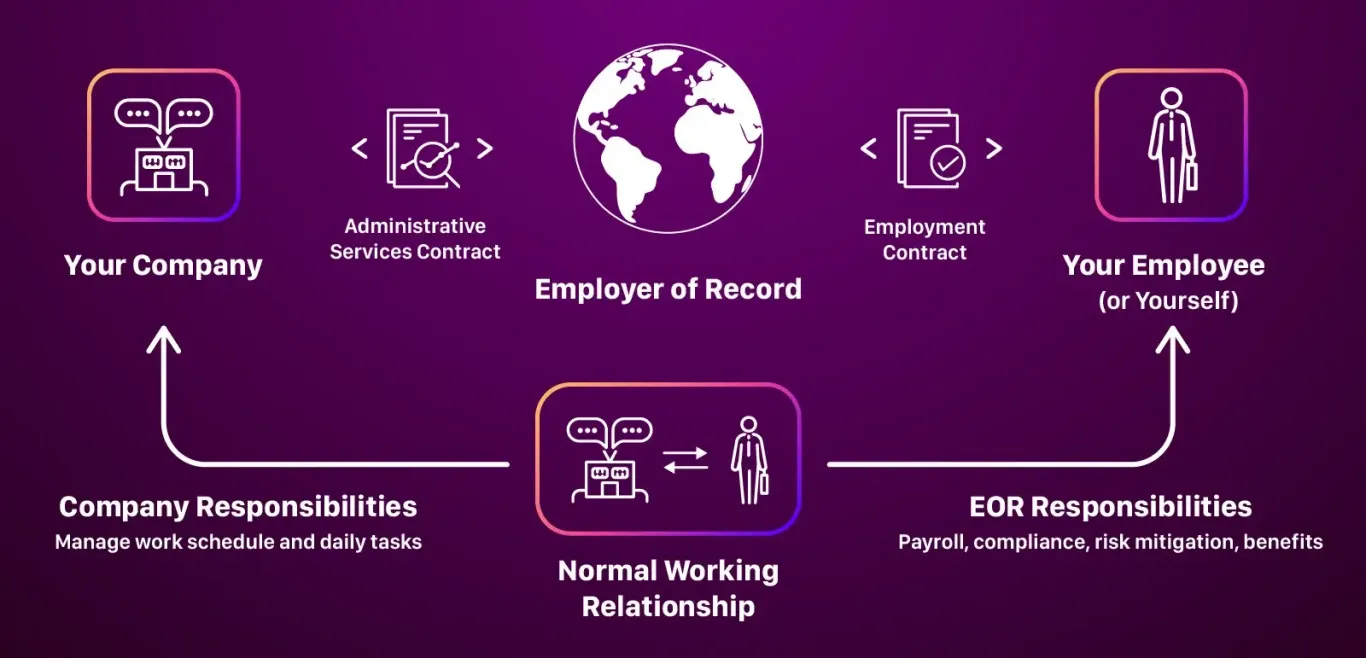
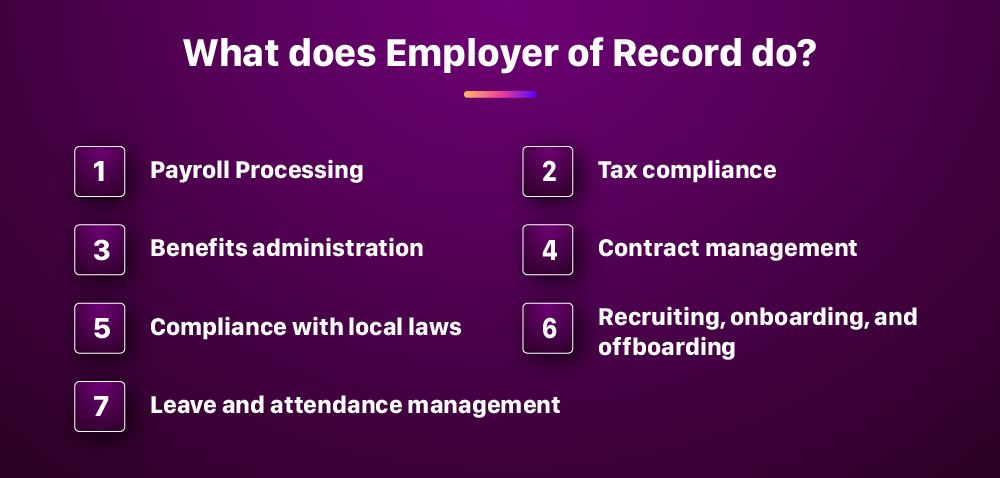
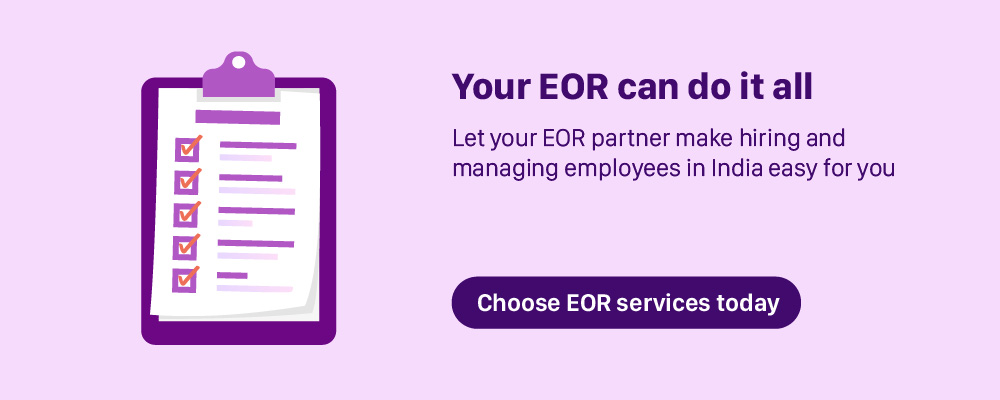
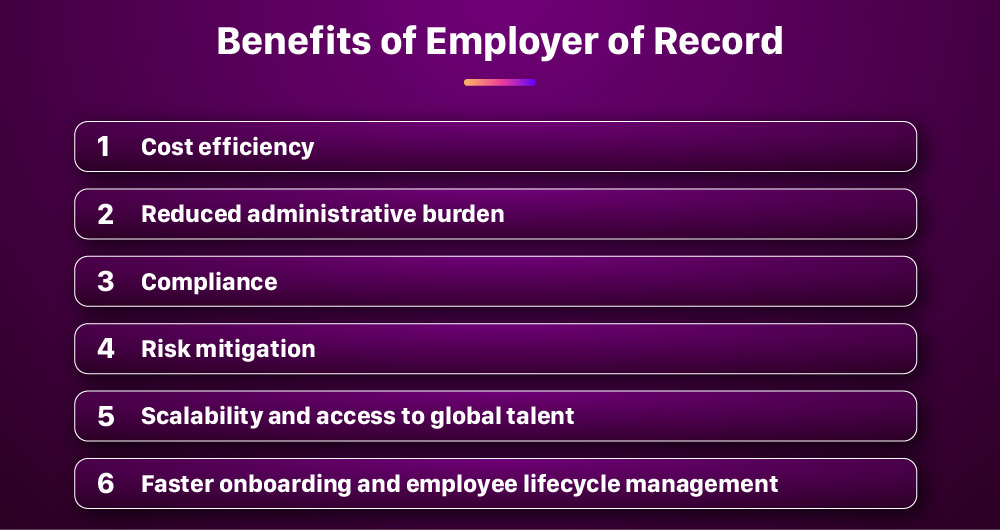
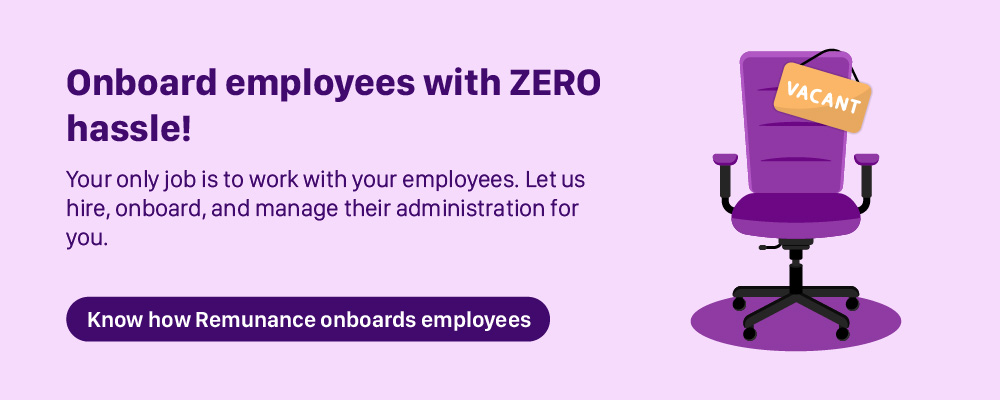
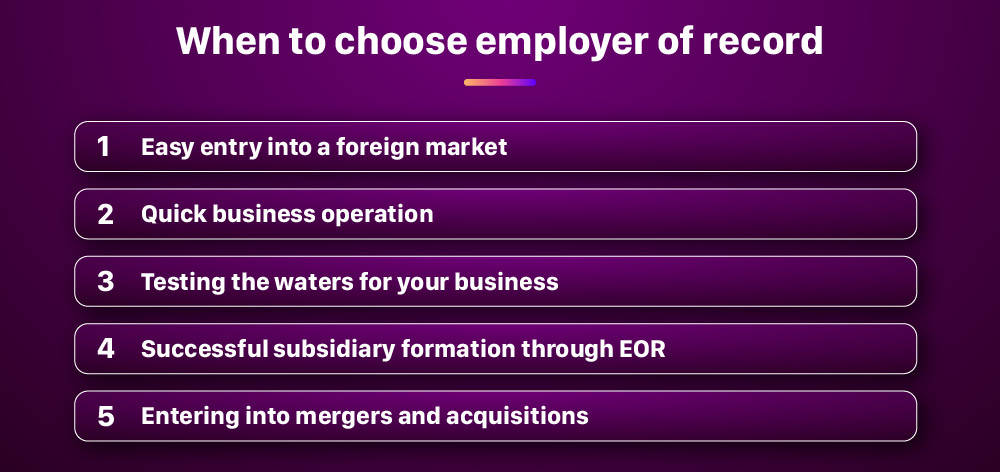

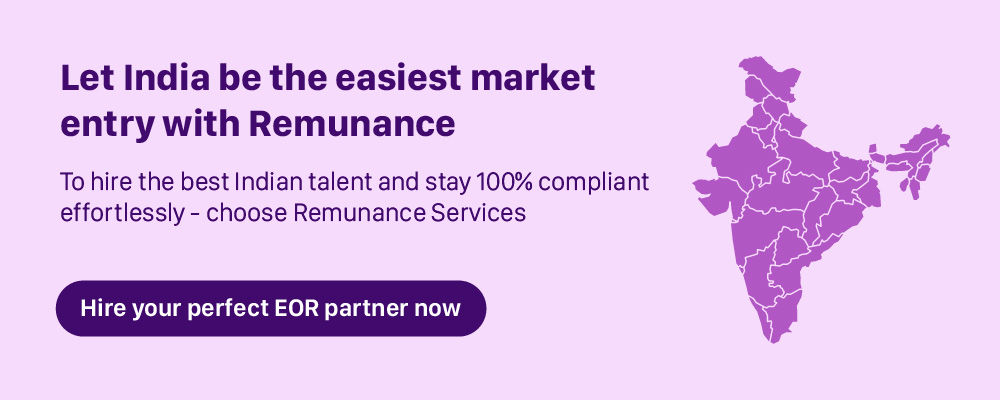


 Schedule a free call
Schedule a free call